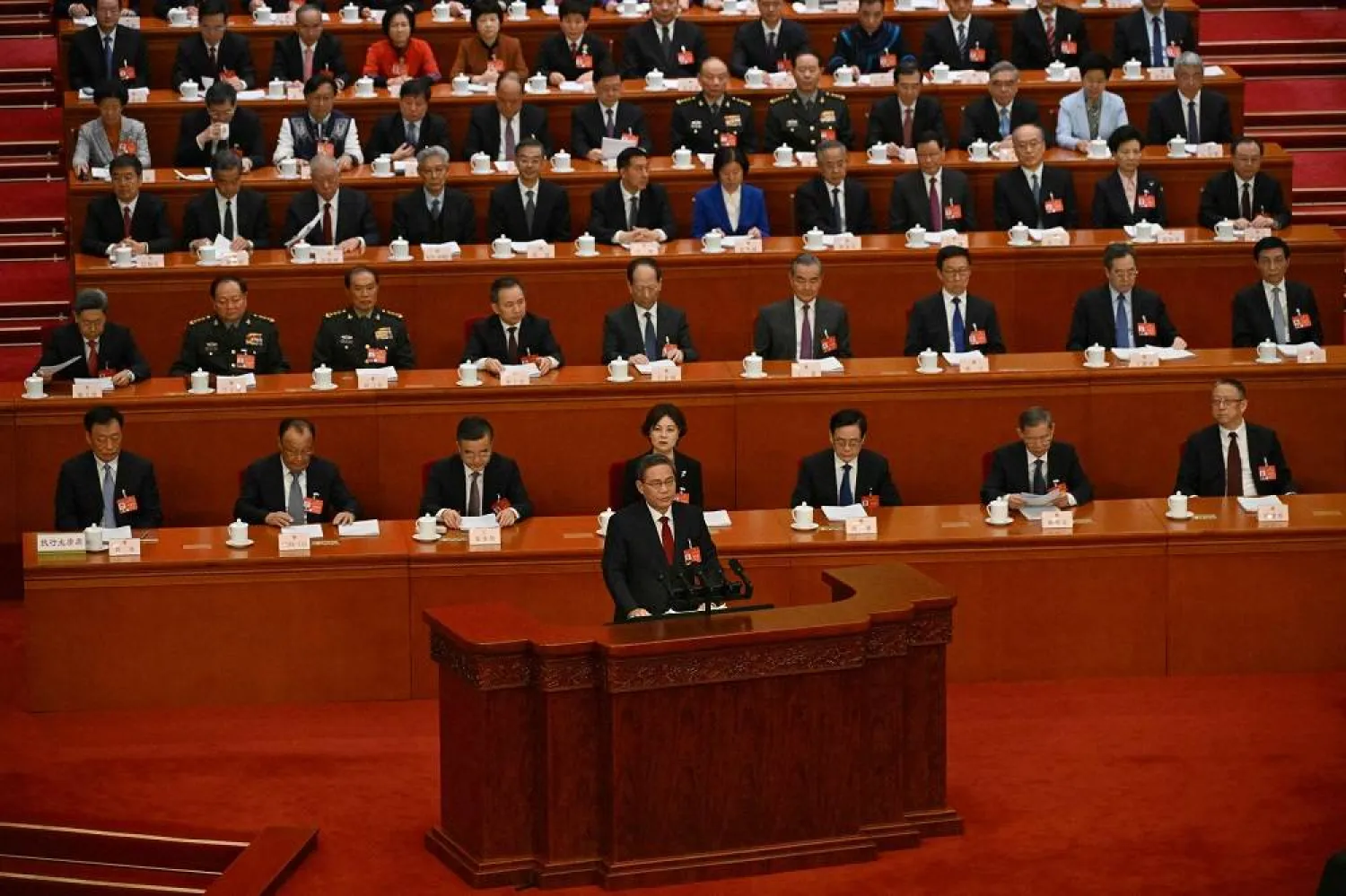Chinese Premier Li Qiang announced an ambitious 2024 economic growth target of around 5% on Tuesday, promising steps to transform the country's development model and defuse risks fueled by bankrupt property developers and indebted cities.
Delivering his maiden work report at the annual meeting of the National People's Congress, China's rubber-stamp parliament, Li also flagged higher defense spending, while hardening the rhetoric on Taiwan.
In setting a growth target similar to last year, which will be harder to reach as a post-COVID recovery is losing steam, Beijing signals it is prioritizing growth over any reforms even as Li pledged bold new policies, analysts said.
"It’s more difficult to achieve 5% this year than last year because the base number has become higher, indicating that the top leaders are committed to supporting economic growth," said Tao Chuan, chief macro analyst at Soochow Securities.
Last year's uneven growth laid bare China's deep structural imbalances, from weak household consumption to increasingly lower returns on investment, prompting calls for a new growth model.
China started the year with a stock market rout and deflation at levels unseen since the global financial crisis of 2008-09. The property crisis and local government debt woes persisted, increasing pressure on China's leaders to come up with new economic policies.
With awe at China's economic miracle fading rapidly, some economists have drawn comparisons with Japan's lost decades since the 1990s, calling for pro-market reforms and measures to boost consumer incomes.
"We should not lose sight of worst-case scenarios," Li said in the Great Hall of the People in Tiananmen Square.
"We must push ahead with transforming the growth model, making structural adjustments, improving quality, and enhancing performance."
There was no timeline or concrete details for the structural changes China intended to implement, however, with Li also emphasizing stability as "the basis for everything we do".
Li acknowledged reaching the target "will not be easy," adding a "proactive" fiscal stance and "prudent" monetary policy was needed. The target considers "the need to boost employment and incomes and prevent and defuse risks," Li said.
The International Monetary Fund projects China's 2024 growth at 4.6%, declining towards 3.5% in 2028.
Chinese stocks and the yuan were largely unchanged.
"Policymakers seem happy with the current trajectory," said Ben Bennett, Asia-Pacific investment strategist at Legal And General Investment Management.
"That’s disappointing for those that hoped for a bigger push... There’s rhetorical support for local government debt and the property sector, but the key is how this is applied in practice."
Moderate stimulus
China plans to run a budget deficit of 3% of economic output, down from a revised 3.8% last year. Crucially, it plans to issue 1 trillion yuan ($139 billion) in special ultra-long term treasury bonds, which are not included in the budget.
The special bond issuance quota for local governments was set at 3.9 trillion yuan, versus 3.8 trillion yuan in 2023. China also set the consumer inflation target at 3% and aims to create over 12 million urban jobs this year, keeping the jobless rate at around 5.5%.
"China is unlikely to do bazooka-style stimulus," said Tommy Xie, head of Greater China research at OCBC Bank. "There are still a lot of constraints at the moment in terms of how China can support the economy via fiscal expenditure."
Budgetary plans included an increase in defense spending by 7.2% this year, similar to 2023 - a figure closely watched by the US and China's neighbors, who are wary about its strategic intentions as tensions rise over Taiwan.
China's defense budget has doubled since President Xi Jinping came to power more than a decade ago. This year marks the 30th in a row of increasing defense expenditure, based on research by the International Institute for Strategic Studies.
Li's report also dropped previous mentions of "peaceful reunification" with Taiwan.
"China is showing that in the coming decade it wants to grow its military to the point where it is prepared to win a war if it has no choice but to fight one," said Li Mingjiang, a defense scholar at the Rajaratnam School of International Studies.
‘New productive forces’
Faced with a demographic crisis that also threatens the switch to a consumer-led growth model, China's state planner vowed to improve policies supporting childbirth, while raising benefits and basic pensions for its growing elderly population.
On the property sector, Li vowed to finance "justified" projects, and provide more social housing as Beijing looks to resolve a glut of unfinished properties that have worried homebuyers.
While Li said China wanted to curb industrial overcapacity, he also flagged more resources for tech innovation and advanced manufacturing, in line with Xi's push for "new productive forces," Li said.
China will also lift all foreign investment restrictions in the manufacturing sector and formulate development plans for quantum computing, big data and artificial intelligence as it strives for technological self-sufficiency.
Some analysts have criticized China's policy focus on manufacturing, saying it exacerbates industrial overcapacity, deepens deflation and heightens trade tensions with the West.
"The pursuit of speed has given way to the change in the model of growth," said Hu Yuexiao, chief economist at Shanghai Securities.









